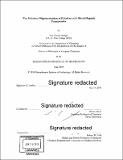The selective oligomerization of ethylene with metal-organic frameworks
Author(s)
Metzger, Eric Daniel
DownloadFull printable version (18.02Mb)
Other Contributors
Massachusetts Institute of Technology. Department of Chemistry.
Advisor
Mircea Dincă.
Terms of use
Metadata
Show full item recordAbstract
The benefits of heterogeneous catalysis for industry and the society at large cannot be overstated, with approximately 90% of all industrial catalysis being performed with heterogeneous catalysts. Despite the undeniable operational advantages of heterogeneous catalysts, several large volume industrial processes involved in the production of commodity chemicals remain impenetrable to solid catalysts. Among them are the selective dimerization of ethylene and the selective trimerization of ethylene, which require fine steric and electronic tuning to optimize the production of the desired olefin. In this thesis, I describe the development of new heterogeneous catalysts to address the lack of activity and selectivity found among heterogeneous catalysts for selective ethylene oligomerizations, with an emphasis on developing new metal-organic framework (MOF) catalysts for the selective dimerization of ethylene to 1-butene. The ability to tune the catalytically active site of a solid at the molecular level places MOFs in prime position to answer challenges in heterogeneous catalysis that no other class of solids has been able to address. Chapter 2 of this thesis describes the development of Ni-MFU-4/, a nickel-substituted MOF with excellent activity and selectivity for the dimerization of ethylene to 1-butene. Although the active sites in the MOF are designed to mimic homogeneous Nitrispyrazolylborate dimerization catalysts, the selectivity observed for the solid catalyst is considerably higher than that of the homogeneous system, highlighting the importance of active site isolation in the porous solid. Chapter 3 details a combination of studies utilizing isotopic labeling and mechanistic probes to demonstrate that Ni-MFU-4/ dimerizes ethylene via the Cossee-Arlman mechanism. Chapter 4 reports the preparation of Ni-CFA-1, a related heterogeneous ethylene dimerization catalyst that is far more synthetically accessible than Ni- MFU-4/. Lastly, chapter 5 relays initial results towards the development of MOF-based ethylene trimerization catalysts.
Description
Thesis: Ph. D. in Inorganic Chemistry, Massachusetts Institute of Technology, Department of Chemistry, 2018. Cataloged from PDF version of thesis. Includes bibliographical references (pages 195-207).
Date issued
2018Department
Massachusetts Institute of Technology. Department of ChemistryPublisher
Massachusetts Institute of Technology
Keywords
Chemistry.